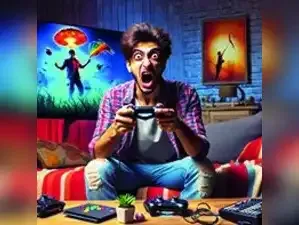Never mind the online gaming Bill for a moment. Instead, India needs to put its game face on to tap the global video game industry. Generating a reported $184 bn in 2024 - compared to a combined $118 bn for movies and music - gaming is pushing the frontiers of the M&E industry by allowing consumers to interact with their subjects. Collaboration among players is improving with games residing on the cloud that stream to extended reality devices over low-latency networks. AI can provide extreme personalisation to make games even more immersive. Cutting-edge entertainment tech is focused on gaming in an effort to increase user engagement. This is driven by slowing user engagement with passive consumption of audiovisual content.
Indian developers need to participate in the entertainment revolution that gaming represents. It has large talent pools in the tech and creative segments that can contribute to the development of the industry globally. It also has a large young population that are active gamers - therefore, potential beta testers. Gaming will eventually splinter along cultural lines. It matters that there should be domestic capacity to cater to evolving consumer preferences. AI-generated game scenarios would work pretty similarly in advertising and entertainment. AI as filmmaker can globalise the media market on an unprecedented scale, and India should grasp the opportunity.
At its core, gaming is a new medium of communication with global broadcast ability. Changes in how people interact with machines could make the gaming experience universally available. The M&E industry's distribution model is also being altered by gamers. e-Sports are increasing audience engagement through interactivity for sports. Gaming's social utility will become more visible as a generation of gamers acquires information on a wide variety of subjects through this medium. The immersiveness, interactivity and scope for collaboration in modern-day gaming makes it an acceptable choice for building cognitive and social skills that go beyond play.
Indian developers need to participate in the entertainment revolution that gaming represents. It has large talent pools in the tech and creative segments that can contribute to the development of the industry globally. It also has a large young population that are active gamers - therefore, potential beta testers. Gaming will eventually splinter along cultural lines. It matters that there should be domestic capacity to cater to evolving consumer preferences. AI-generated game scenarios would work pretty similarly in advertising and entertainment. AI as filmmaker can globalise the media market on an unprecedented scale, and India should grasp the opportunity.
At its core, gaming is a new medium of communication with global broadcast ability. Changes in how people interact with machines could make the gaming experience universally available. The M&E industry's distribution model is also being altered by gamers. e-Sports are increasing audience engagement through interactivity for sports. Gaming's social utility will become more visible as a generation of gamers acquires information on a wide variety of subjects through this medium. The immersiveness, interactivity and scope for collaboration in modern-day gaming makes it an acceptable choice for building cognitive and social skills that go beyond play.








